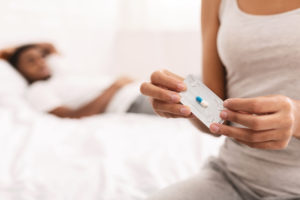
Becky Yoza, DNP
FAMILY MEDICINE
Becky has 14 years combined experience in medical/surgical and emergency nursing. She also teaches undergraduate and graduate nursing at Hawaii Pacific University. Originally a sociologist, Becky trained as a nurse to gain knowledge for her research, but she ended up loving nursing so much she never went back! Born and raised in Michigan, Becky has lived in Hawaii since 2010 and never wants to leave.
Emergency Contraception
Emergency contraception is a method of preventing unwanted pregnancy after unprotected sex. There are a variety of emergency contraception methods. If you would need, doctors will prescribe a morning-after pill. You can get the morning after pill prescription online.

What is emergency contraception?
One can get a morning-after pill prescription online. You can use this in the following cases. For instance:
- If you had vaginal intercourse using no contraception.
- If you had vaginal intercourse, and you suspect problems with the first line of contraception. Problems include forgetting to take your regular contraceptive pills. Or if the condom split.
There are three common options available for emergency contraception. For example, the progestin pill, the ulipristal acetate pill and the Intra-Uterine contraceptive device (IUD).
Emergency contraception option 1: The progestin pill
This pill contains levonorgestrel, which is a progestin hormone. They sell the pill under several brand names. But all contain exactly the same dose of levonorgestrel. Each pill contains 1.5 mg of levonorgestrel, and the usual dose is one tablet. However, sometimes, a higher dose may be warranted. These cases include:
- If your weight is above 154lbs or your BMI is greater than 26, take a double dose.
- If you are taking other medicines, you may need a higher dose. Especially if you are taking anti-epilepsy medicines. We recommend that you get in touch with your doctor to determine the dose suited for you.
When do I take it and how does it work?
You should take the pill as soon as you can after having unprotected sex. Importantly take the pill within 72 hours (three days). This pill works by either preventing or delaying ovulation, which is the release of the egg from the ovary. Therefore, it does not cause an abortion. In other words, it will not end a pregnancy if the embryo has already implanted. It is essential to take the pill as soon as possible. If not, it will be ineffective if ovulation has already taken place.
How effective is the POP pill?
Taken within 72 hours of unprotected sex, the progesterone pill is effective in avoiding unwanted pregnancy. However, after 72 hours, its efficacy decreases. Especially after 96 hours. Exact effectiveness is difficult to study. This is because not all women having unprotected sex become pregnant. Studies show that about 6%–8% of women who have unprotected sex become pregnant. Only about 0.6%–2.6% of women are likely to get pregnant when taking the progestin pill. The efficacy also depends on when the pill is taken in terms of the menstrual cycle. If you take the pill after ovulation, it will not work. It’s better for you to contact your doctor for an IUD. Ovulation, for a regular 28-day cycle, happens around the 14th day.
You should remember that although the progestin pill is effective, it should be used in case of emergencies. It should not be a planned contraceptive method. A morning-after pill prescription can be given online.
Are there any side effects with the emergency progestin pill?
It is uncommon to have any side effects due to the progestin pill. However, some women report feeling nauseous for 24 hours after the pill. Eating something before taking the pill may reduce nausea. It may also reduce instances of vomiting. However, if you vomit within three hours of having taken the pill, then you must take another dose. You may also want to ask your doctor about a prescription for anti-nausea tablets. Or opt for the IUD. Other than this, you may experience some mild symptoms for a short time. Symptoms such as diarrhea, dizziness and breast tenderness. Further, you may experience delayed or early periods. This is because the pill contains hormones. In addition, you may witness some erratic bleeding.
Who should not take the emergency progestogen pill?
While most women should be able to take the progestin pill, some may need to avoid it. For example:
- If you suffer from the rare condition, porphyria, you should not take it.
- If you suffer from severe gut disease, you should not take it. Also, don’t take it if you have a history of ectopic or molar pregnancy as well.
Further, if you are taking any of the following medicines, avoid progestin. This is because it will not work effectively. These include, for example:
- Medicines for epilepsy including Phenytoin and Carbamazepine.
- Two antibiotics called Rifampicin and Rifabutin. However, other antibiotics are safe to take with progestin.
- An over-the-counter remedy for low mood, known as St John’s wort.
- Some medicines used to treat HIV and AIDS, such as Ritonavir.
Because of the reasons above, be honest and transparent with your doctor. Inform your doctor about your current medical conditions. Furthermore, inform your doctor of any medications that you may take. This is important for your doctor to know before giving you a morning-after pill prescription. As an important note, if progestin cannot work, and you conceive, the medicine will not harm the development of the fetus.
Emergency contraception option 2: Ulipristal acetate pill
Ulipristal acetate is a selective progestin receptor modulator. This means it is an antiprogestin. It is available under several brand names. There are morning-after pill prescriptions available online.
When do I take it and how does it work?
You must take the pill as soon as possible after unprotected sex. Its efficacy is the highest if taken within 120 hours (5 days). The earlier you take the pill, the more effective it is. The hormone works by preventing or delaying ovulation.
How effective is ulipristal acetate?
If taken within 120 hours of unprotected sex, the ulipristal acetate pill has a good chance of avoiding unwanted pregnancy. Its effectiveness is lower if taken beyond the 120 hour period. A morning-after pill prescription can be given online.
While the exact effectiveness of the pill is difficult to study, the ulipristal acetate pill has been found to be more effective than the progestin pill. Especially if taken after the first 72 hours. However, the effectiveness of the pill may be lower in women who weigh more than 187lbs. Additionally, it may be lower in women whose BMI is above 30.
If one takes the pill after ovulation, it will not work. It is better for you to contact your doctor for an IUD. For a regular 28-day cycle, ovulation happens around the 14th day. Although the pill is effective, only use it in emergencies. It should not be a planned contraceptive method.
Who should not take ulipristal acetate?
You must avoid taking ulipristal acetate if you suffer from severe asthma. Lactating mothers should avoid feeding for one week after taking the pill. Express and discard breast milk so that your milk supply remains unaffected.
Certain medications reduce the effectiveness of ulipristal acetate. Therefore, it is better you use other forms of emergency contraception if you are taking any of these medications. Medications which may interfere with ulipristal acetate include, for example:
- Contraceptive pills containing progestogens. Pills that contain progestin. This includes the above emergency contraceptive pill. Progestin-only pills and combined oral contraceptive pills reduce the effectiveness of ulipristal acetate. Therefore, you ensure that you have not taken contraceptive pills in the past week. Contraceptive pills such as your regular planned contraceptive pill. And the emergency contraceptive pill containing levonorgestrel. Further, after taking the ulipristal acetate pill, you must not take any contraception pill for five days.
- Medicines for epilepsy, including Phenytoin and Carbamazepine.
- Two antibiotics called Rifampicin and Rifabutin. Other antibiotics are safe to take with progestin.
- An over-the-counter remedy for low mood, known as St John’s wort.
- Some medicines used to treat HIV and AIDS, such as Ritonavir.
Because of the reasons above, ensure that you are honest and transparent with your doctor. Share your current medical conditions and any medications that you may take.
Are there any side-effects of ulipristal acetate?
It is uncommon to have any side-effects with the ulipristal acetate pill. However, some instances of side effects have been reported. Side effects such as headaches, nausea, and abdominal pain. Dizziness and muscle pains. You may witness some changes in your menstrual cycle. Changes such as periods arriving earlier or later than usual. Additionally, you may experience some erratic bleeding. If you vomit within three hours of taking the ulipristal acetate pill, then you must take another dose.
Emergency contraception pills could be less effective in the following situations:
- If taken after ovulation.
- If one takes the progestogen pill more than 72 hours after unprotected sex. Furthermore, if one takes the ulipristal acetate pill more than 120 hours after unprotected sex.
- You vomit within three hours of taking the pill and do not take another dose.
- If you also had unprotected sex at an earlier time since your last period.
- If you have unprotected sex again after taking emergency contraception.
Emergency contraception pills could be less effective in the following situations continued:
- If you experience abdominal pain or abnormal bleeding within 2-6 weeks of taking emergency contraception, visit your doctor immediately. These could be the signs of an ectopic pregnancy (which is rare).
- Most women should have their next period at the usual time. The period might have minor delays or be a few days earlier. However, you should visit your doctor if your periods are late by a week or more or if they’re lighter than usual.
- Your next menstrual cycle may also be shorter or longer than usual.
- There is always a small risk of pregnancy. Even if you use an emergency contraceptive correctly.
- You should take a pregnancy test three weeks after having unprotected sex. This is to be sure the emergency contraception has worked.
- If taking the ulipristal acetate pill, ensure that you do not start your regular contraceptive pills immediately.
- You may want to visit a doctor to know which regular contraceptive method may suit you and your partner.
Meet some of our doctors and experts
Here are some of the conditions we treat:
Questions regarding treatment? Contact us! We're here to help.
ALL MAJOR INSURANCE ACCEPTED
Visit with a board-certified Hawaii doctor online or by phone.

Here’s what people are saying
Kaimani
North Shore, Oahu
![]()
"I thought the whole process was pretty cool. To be able do this all on the phone instead of wasting an hour or two to see my doctor and wait all that time to speak with my doctor for only 5 minutes. The best part was I didn't feel rushed either during the video consult. The doctor really took her time speaking with me and more so than my regular doctor would have the time to do so with me.
Susan
Manoa, Oahu
![]()
This was so convenient for me and my family, especially since we are traveling and this saved me a trip to Urgent Care, who knows how long that could have taken. I appreciate how prompt the doctor and the staff were with contacting me.
Meliana
Lahaina, Maui
![]()
This was so great for my Dad to use as he is visiting from another country and he doesnt have health insurance. For something as simple as an earache, we didn't have to spend so much money on a quick doctor's visit. Plus the doctor was able to help my Dad sooner than our scheduled appointment!
Nalu
Mililani, Oahu
![]()
"Everything was very helpful from the initial call down the getting my prescription. I wish I could take this service back home with me to Canada!"
Allie
Lahaina, Maui
![]()
The whole experience was super fast! That was thee fastest appointment I have ever had, especially for something as simple as a prescription refill. Plus I had to pick my son up for school.
Nicki
Kapolei, Oahu
![]()
The fact that I was able to do all of this without getting out of my bed. From the time I made my appointment to hearing my prescription is ready, its been less than 1 hour.
Kawika
Aiea, Oahu
![]()
Video consult was my favorite part. I've never done a telemedicine visit before and it was cool. I can really see this being great for people with busy schedules, not to mention there is nothing like this in Hawaii yet.
Salesi
Lihue, Kauai
![]()
"Convenience from the comfort of your own home. Some times it can be a hassle getting out of house when you're already not feeling well to see your doctor, or even just to get a refill. But this is a very convenient service."
Andrea
Kailua, Oahu
![]()
"Just being able to do it at home and ON TIME was great, because I didn't have to spend the time to commute and spend time in the waiting room to MAYBE see my doctor at my scheduled appointment time. The doctor called me as soon on the dot of my appointment time."
Puka
Waimea, Big Island
![]()
The best part was definitely seeing the doctor on the video call. It is comforting as a patient that there is a real doctor on the other end laying eyes on me and the symptoms I could be having.
Chris
Kona, Big Island
![]()
"The doctor was great and took his time explaining my symptoms and treatment! Actually the whole experience was fantastic! I can't believe how efficient you guys are. It hasn't even been 30 minutes and I've already been contacted by pharmacy that my prescription is ready. This was great. I would definitely use this service again and highly recommend to others!"
We're trusted by local individuals and organizations.









